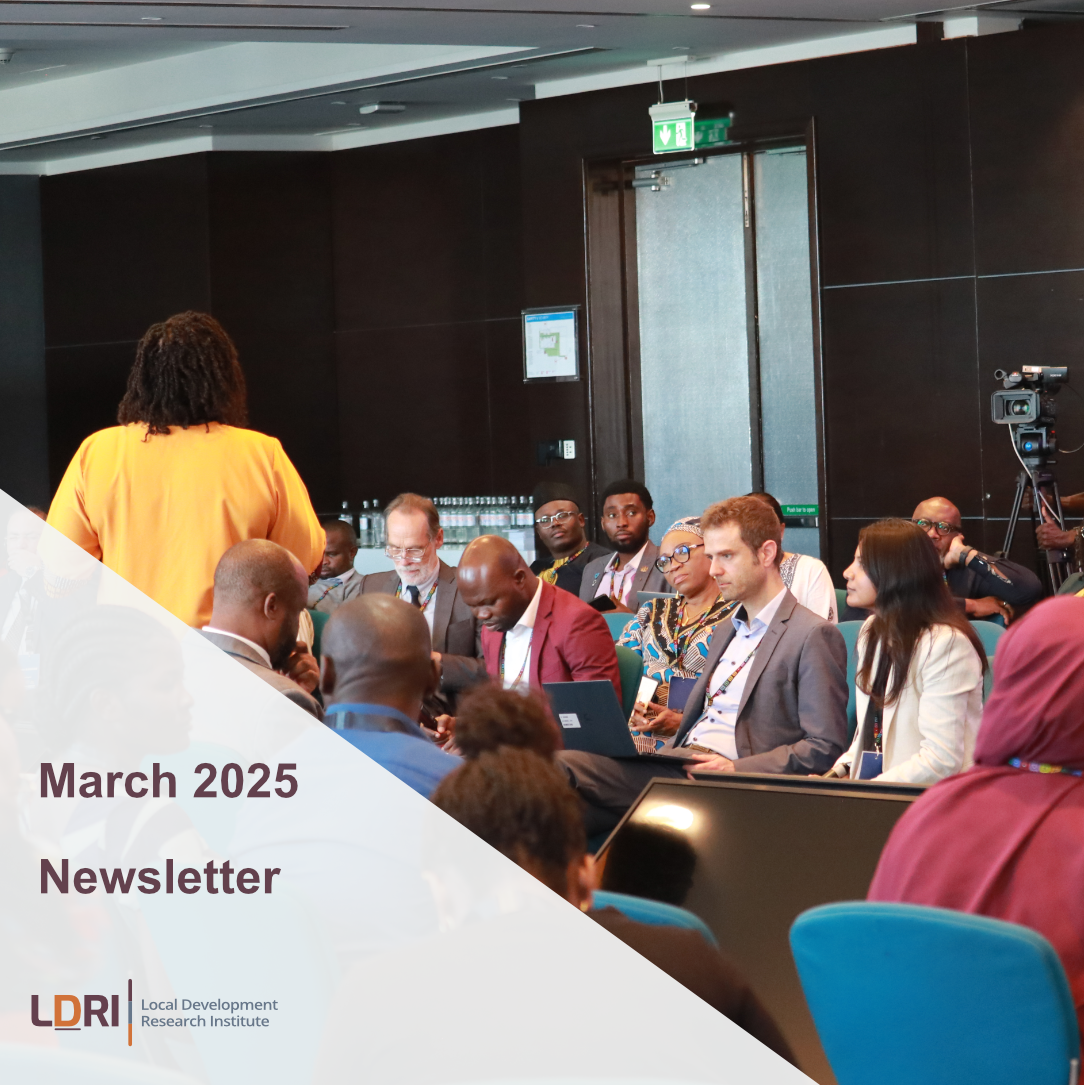![]()
March In Review

| Dear LDRI Community, Welcome to the latest edition of the LDRI newsletter! This year is extra special as we celebrate 10 years of driving data-driven policy and innovation across Africa. From pioneering research to transformative partnerships, we remain committed to advancing open data, governance, and sustainable development. Our newsletter puts together content including a reading list, avenues for capacity building, and events from different stakeholders across the globe on the use of data for better service delivery in sectors such as Governance, Gender, Agriculture, and AI. |
| FEATURED THIS MONTH: |
| Reflections On The OGP Africa and Middle East Regional Meeting: LDRI Session On Participatory Digital Governance At the OGP Africa and Middle East Regional Meeting, the Local Development Research Institute (LDRI) and the African Observatory on Responsible AI convened a session on “Participatory Digital Governance: Making Innovations Work For Everyone.” As governments increasingly leverage digital technologies, AI, and data-driven decision-making, the need for transparency, inclusivity, and accountability in governance has never been more urgent. This interactive workshop brainstormed approaches and frameworks that enable meaningful public engagement in shaping how governments procure, develop, and use digital technologies while collectively reimagining a future where citizen participation ensures the governance of emerging technologies safeguarding fundamental human rights such as privacy and self-determination, promoting equitable access to opportunities and improved service delivery.During the session, panelists and participants explored critical questions: 1. Developing AI & Digital Governance Frameworks – How can African governments create AI and digital governance policies that respect local contexts while ensuring transparency and accountability in digital services? 2. Ensuring Algorithmic Transparency & Accountability – What are the most effective mechanisms for making government AI systems more transparent and accountable, and how can they be adapted for diverse African and Middle Eastern contexts? 3. Bridging Innovation & Inclusive Governance – What challenges do governments face in balancing digital innovation with inclusive access and citizen participation, and what policies or frameworks can strengthen public engagement in digital governance?Speakers from the OECD, Research ICT Africa, Strathmore University, Zambia’s ICT Department, and Social Watch Benin shared invaluable insights, emphasizing the importance of inclusive policy design, citizen engagement, and ethical AI development. Key Takeaways: ✅ Public engagement is crucial—digital governance must be people-centered. ✅ AI and automation should enhance, not replace, accountability mechanisms. ✅ Multi-stakeholder collaboration, inclusive of both developers and users, is key to ensuring equitable access to digital opportunities As we move forward, LDRI remains committed to advancing responsible digital governance frameworks that prioritize human rights, equity, and transparency through our digital services programme by developing engagement frameworks that support clear and consistent communication between institutions and citizens . Learn More |
| RESOURCES |
| Paradigm Initiative: Devolved Impunity – The State of Safety and Security of Bloggers in Kenya (2019 – 2024) Blogging in Kenya has evolved from personal online journals to a critical platform for news, activism, and public discourse. However, this transformation has exposed bloggers to significant threats, both physical and digital. Bloggers face harassment, abduction, and even murder, particularly when criticizing authorities or influential figures. Digital threats, including surveillance, hacking, and online harassment, are exacerbated by vague cybercrime laws. A survey of bloggers and civil society members found that all respondents had encountered security threats, with 58.3% rating their safety as “very unsafe.” Legal challenges, particularly under the Computer Misuse and Cybercrimes Act, 2018, further restrict freedom of expression, creating a chilling effect that leads to self-censorship. Download The Report World Bank: Food Security Update Conflict and weather-related events continue to drive food insecurity in different countries. Mass displacement, a collapsing economy, the breakdown of essential social services, severe societal disruptions, and limited humanitarian access driven by the conflict in Sudan continue to cause an unprecedented food and nutrition crisis with nearly 25 million people (half of the population) are facing acute food insecurity, with Famine conditions (IPC Phase 5) spreading across the country. Download Latest BriefOpenData Watch X Data2x: Integrating Intersectionality in Data Systems: A Practical Guide Across the Data Value Chain.Intersectionality is a framework that recognizes that a person’s sex, age, ethnicity, and other social identities interact to create unique experiences of advantage and disadvantage. Integrating an intersectional lens across the data value chain—from data collection and publication to uptake and use—goes beyond technical improvements. It aims to shift power dynamics in data governance for more equitable outcomes and inclusive data. This brief provides a practical guide for planning to build better data systems by integrating intersectionality at each stage of the data value chain, improving the quality and value of data, and creating meaningful impact. Read More CIPIT Strathmore University: Data from the South, AI in the North: An Uneven Distribution of ValueArtificial intelligence (AI) can be viewed as both a global commodity and an emerging supply chain, comprising a variety of interdependent components for its functionality. Akin to traditional goods such as clothing or footwear, AI systems necessitate natural resources, labor, infrastructure, capital, and logistics for their production. However, the activities surrounding AI significantly diverge from conventional manufacturing value chains. This divergence stems from the technological complexities and the unique nature of digital inputs that AI demands. Comprehending the foundations of these production practices is crucial for understanding the multifaceted nature of AI’s supply chain. Read More Kenya’s AI Strategy 2025-2030 Kenya’s Artificial Intelligence Strategy envisions the country as Africa’s leading artificial intelligence (AI) hub for model innovation, driving sustainable development, economic growth, and social inclusion while positioning itself as an AI research and application leader on the continent. Recognising the transformative potential of AI, the strategy also commits to safeguarding national interests by embedding robust data sovereignty, a cybersecurity framework, and ethical oversight in AI deployment. These measures will ensure that Kenya’s AI ecosystem is secure and equitable. The strategy provides a comprehensive framework to guide Kenya in harnessing the transformative power of AI, ensuring its deployment benefits all sectors of society while adhering to ethical principles and inclusivity. Read More |
| UPCOMING OPPORTUNITIES/EVENT |
| Southern Perspectives: DPI and Open Data as Public Goods The Data For Development Network will be hosting the next Southern Perspectives Webinar, DPI and Open Data as Public Goods. During the webinar, experts will explore the intersection of DPI and open data as public goods. As global discussions advance on the Global. Register To Join Have Something to Share? If you have any ideas for collaboration with us, or if you have any blog posts on Data, AI, or Primary health care, Gender, Agriculture, and Open Government that you would like us to promote through our platform or any events, opportunities, research, or research projects you would like for us to share within our growing network please email us at comms@developlocal.org |


